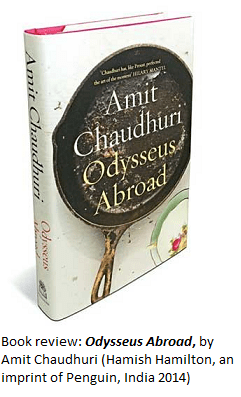ODYSSEUS ABROAD: MIGRATING FROM EPIC TO MUNDANE
Amit Chaudhuri’s sixth novel Odysseus Abroad is a reflection on journeys. The title being borrowed from the Greek epic, the 241 pages muse upon various modes and ways of journeys made and unmade, to be made or could have been made. Following the timeline of a single day, as the protagonist, Ananda Sen makes his journey from his apartment in 16 Warren Street to Belsize Park and back, the novel unfolds the stories of not just Ananda’s journeys but also the journeys of those he meets physically or on his mental map. The story is thus as much Ananda’s as it is his parents’, Rangamama’s, Nestor Davidson’s or Hillary Burton’s. It also in a way becomes the story of English Literature as Ananda’s mind traverses through its various periods, pausing to reflect fondly at some, racing ahead a few lanes, or simply moving about lazily through timelines, tracing the journey of British literature as he attempts to make it his own.
Written in adherence to the modernist tradition, the book is as much in dialogue with Joyce’s Ullysses as it is with the Homeric epic. Chaudhuri perfects the modernist’s obsession with the moment so much so that the reader almost feels like a flaneur within the mind of the protagonist. The pace of the book contributes to the experience of loitering. Moving on at a lazy pace, it allows the reader to wander about Ananda’s mind-palace , amusing oneself with the intensity of the remembered moments, quietly making notes or just simply observing as they pass by. As Ananda wanders about the streets of London reminiscing certain moments, the reader is offered the chance to play voyeur to them, or at times even slipping off one person’s mind to get into that of the other. Interestingly though, while following the modernist style, the novel also redefines the form. In tracing Ananda and Rangamama’s relationship with the city of London, the story also becomes a postcolonial retelling of the English classic.
It is these stories of Rangamama, Khuku, Ananda that further interweave to tell different kinds of stories of quest for home. The lives of Rangamama and Ananda depict two different generations of diaspora , and it is in their dwelling on certain moments that newer nests get built. The theme of search for home or being at home is one that runs throughout the novel and finds expression through unusual minor details like food, language or even little habits of love. Rendered outsider in both worlds, they tend to find home in what Homi Bhabha terms as ‘third space’: be it in Sylhet accent, Bengali food, Tagore’s music or even familial memories that help them build imaginary homelands on foreign grounds. Parallel to these explorations of identities is also the need to find ‘home’ in language.
Being an English literature student, one of Ananda’s quests is also of building a home within these foreign words. He had grown up reading words about worlds to which he could scarcely relate; it is only when he comes to London that he realizes the meaning of Shakespeare’s lines: ‘Shall I compare thee to a summer’s day’. Yet, it is also through this quest for a hybrid identity, through his struggles with alien words, that he finds home in Larkin’s poetry or Keats’ letters to Fanny Browne.
Written with a wry humour, the narrative is often self-reflexive, self-deprecating so much so that the reader is almost instantly taken in with the extraordinariness of mundane trivialities. The characters with their own idiosyncrasies slowly grow on the reader as one engages with their everyday moments. The relationship between Rangamama and Ananda forms another interesting aspect of the book. Modelled loosely on the story of Odysseus and Telemachus, this story of an unusual friendship adds another layer to the narrative as do the relationships forged between Khuku and her brother, Ananda and his mother, Ananda’s father and Rangamama and even Ananda and Nestor Davidson. Along with the stories of Ananda’s incestuous relationship with his cousin, they all weave in to tell multiple stories of love and ways of loving.
Demonstrating a languor, almost reminiscent of The Logus Eaters, the story also subverts (and sometimes even mocks) the epic form in its postcolonial modernist retelling. At the very least, it seems to suggest that, in modern times, the epic has no relevance divorced from the mundane – and that there are epic moments in the ostesibly ordinary.
The journey undertaken here leads one nowhere. For the diaspora, the horizon of the homeland keeps receding. Bereft of the hope of returning to one’s roots, or finding one’s way back home; all one is left with are moments – small spaces of respite, of temporary nesting. The destination is not of consequence here, it is the journey that matters. The reader is therefore forced to surrender to the book’s environment and embrace the timeless limbo that the narrative creates, empathize with the characters, look closely into the details of the moments, and embark on a journey of one’s own: a journey where the questions of ‘where’ or ‘when’ becomes irrelevant as the question of ‘how’ takes precedence. With no Ithaca to return to, no homogenous congruous identity to cling on, Chaudhuri’s Ananda is nothing but ordinary. Yet it is in his quotidian existence, in the ordinariness of his journeys, through his fragmented hybrid identities and multiple truths, that he emerges a hero.
 The Global Calcuttan Magazine
The Global Calcuttan Magazine 
